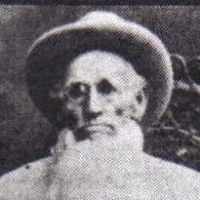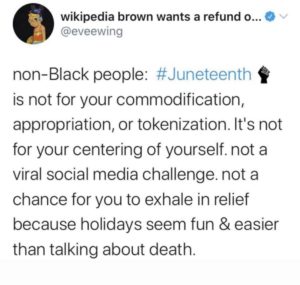Today is June 19th or, as it is nationally known, Juneteenth. When I was growing up I had a passing knowledge of the date and what it meant but, like much of my public school education, the details had faded from memory.
This year I decided to do some research into my own family history because it feels important in a time when many states are blocking education and books about the history of slavery in America (including 1619 which taught me that slavery predates American independence).
While Juneteenth is a national holiday and a celebration for the black community, we cannot ignore that such a commemoration would not be necessary were it not for the enslaving people.
Note: over the years of educating myself about racist systems and thought, I’ve changed much of my language. Instead of talking about “slaves” I now mention “enslaved people.” Instead of “slaver owner” I use “enslaver” as both of these shifts put the burden of responsibility on the individuals who thought slavery was an appropriate action and dehumanized others.
When I think about my mom’s side of the family, the earliest ancestor I can recall is my great-great-great-grandpa Andrew, because while he died nearly 100 years ago, he is one of the first family members who had his photo taken.

Andrew Jeter 1841-1924
But thanks to the Jeter Family Mosaic assembled in 1987 by Grata Jeter, I can go back further than Andrew. If we go back just one generation, we find my 4x great grandpa, James Jeter, who was born in South Carolina in 1795. In 1815, when James was 20 years old, he served in the War of 1812 in the Battle of New Orleans under General Andrew Jackson (who went on to serve as the 7th President of the US in 1829).
James and his wife Nancy lived in Alabama, Arkansas and Texas and their 10th child, born in Alabama in May 1841 was Andrew Jackson Jeter.
In the first 9 years of Andrew’s life his family moved into a 440-acre plantation and purchased 9 people they enslaved, based on the 1850 Census. Reading these details in a massive family history book reminded me so clearly that those who were enslaved had their own families ripped away. They could not trace their lineage, a family name or the stories of their ancestors.
Forcefully removing someone’s family history is another layer of dehumanization.
James Jeter and his family moved to Texas in 1863 to escape the Civil War and there they freed the men and women they had enslaved. The remainder of Texas’ enslaved people would be freed on June 19th, 1865. While it would be easy to see this ancestor of mine as ahead of the game, let’s not forget that the Emancipation Proclamation was issued by Lincoln on September 22, 1862.
The history of slavery in America is one that is easy to look away from, to pretend that we are divorced from its impacts due to time and generations long past. To do so is to ignore the implications of an economic system that stole the labor of black people for hundreds of years, that broke up families and created a legacy that became enshrined in our national systems of governance and still exist today.
It’s easy to think that we are so far removed from that reality. I know different.
Andrew became the father of James Lee in 1876.
James Lee became the father of Mart in 1904.
Mart became the father of Thelma in 1929.
Thelma became the mother of Joyce in 1953.
Joyce became my mother in 1984.
That’s just 7 generations, 160 years since my family gained economic advantages by using the labor of black people they’d enslaved. The family history, while written in the 1980s, is still woefully out of touch. Here are just a few examples:
“Freed slaves represented a property loss to the south which was estimated to be almost two billion dollars. At first too bewildered to appreciate the meaning of their new status, some slaves remained with their former masters until their role as freemen had been clarified.”
“Johnny Jeter’s untimely death [in 1893] resulted from pneumonia after he fell through an iced-over pond on a bitterly cold day. He was returning home from college classes at the time, and his death caused his grieving father to vow that no other of his children would leave home to attend college.”
These two stories demonstrate, to me, that on a micro and macro level we need to understand the past if we’re going to learn from it. The second story illustrates how superstitious and backward farmers could ban higher education in their family due to fear after the death of a child. These same people would have, thirty years earlier, lamented the personal loss of property in the form of human beings, all while separating children from mothers, selling people as if they were cattle and with no self-awareness of their depravity.
In closing, I want to share a tweet that reminded me that Juneteenth is not my holiday, but it is a chance to reflect upon the role my family played in the past as participants in the machinery of slavery and what role we (I) play now in perpetuating its stranglehold on our systems.
